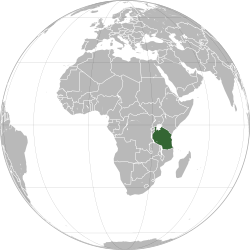Friday, June 6, 2025

Image: Nana Afriyie.

Image: Erin Scott.
On Monday, activist and photojournalist Boniface Mwangi from Kenya alleged at a joint press conference with Ugandan journalist Agather Atuhaire in Nairobi, Kenya’s capital, that Tanzanian security officers had tortured and sexually assaulted them while they were being held in detention between May 19 and 23 in the country’s main city Dar es Salaam.
Atuhaire and Mwangi had initially travelled to Tanzania to appear before the first court appearance of arrested opposition leader Tundu Lissu on May 19. That same day, police officers abducted the two activists from their hotel rooms in Dar es Salaam and took them to immigration offices while blindfolded. After interrogations and threats, they were transferred to the Central Police Station and then to an unidentified facility, where the abuses occurred. Mwangi was later left abandoned on May 22 near the border between Tanzania and Kenya, while Atuhaire was dumped near the Ugandan border the day after.
In the press conference this Monday, Mwangi told BBC and The Eastleigh Voice about his experiences, including being tied upside down, beaten on his feet and having his intimate parts exposed. He cried as he gave accounts of the abuses in graphic details: “[they] put lubricant in my rectum and started inserting objects in my backside.” He further added that the authorities forced him to say asante (the Swahili-language word for “thank you”) to the President Samia Suluhu Hassan while he was being assaulted, and that they threatened to leak their video footage if he spoke up about the abuses: “They interrogated me about my family, email, passwords, everything.” He claimed to have suffered wounds and fractures all over his body.
Dar es Salaam police chief Jumanne Muliro expressed scepticism about Mwangi’s allegations, dismissing them as “hearsay” and “opinions” from activists. When inquired by Reuters about the allegations on June 2, Tanzania’s foreign affairs ministry and police didn’t give an immediate response.
Atuhaire had made similar similar allegations late May, telling BBC that authorities beat and sexually assaulted her and violently stripped her naked, at one point even covering her mouth to keep her from screaming. Mwangi had said any attempts by the two to contact each other in the location were met with insults and kicks from the torturers. At the press conference, Atuhaire said she previously never imagined there would be a worse government than her own “very dictatorial” country, further adding that she filed a criminal complaint against the authorities involved in the abuses.
Local and international rights groups reacted to the activists’ mistreatment with concern. The Kenyan branch of Amnesty International published a statement on Tuesday condemning the abuses and called for those responsible to be held accountable. The Bureau of African Affairs from the US Department of State highlighted that Atuhaire had received the International Women of Courage Award in 2024.
On the day of Mwangi’s and Atuhaire’s arrests, Hassan accused foreign activists of interfering in Tanzania’s internal affairs and “creating chaos”: “If they have been contained in their country, let them not come here to meddle. Let’s not give them a chance.” Hassan later said in June she is committed to respecting human rights.
Tundu Lissu, from the opposition Chadema party, demands drastic changes on political reforms, calling the upcoming presidential election in October neither free nor fair. He had been initially arrested on April 9 for what prosecutors claimed were attempts to “block the polls” and then charged with treason and posting “false information online” which could potentially result in capital punishment; he denied both charges, and his supporters called the allegations politicised. His party was banned from participating in the election a couple of days later for refusing to sign a code of conduct offered by the Independent National Elections Commission.
At his court appearance on May 19, hundreds of supporters chanted his campaign slogan “No reforms, no election” as he defiantly clenched his first. “We will be fine. – Don’t worry at all,” Lissu had addressed them. Lissu’s lawyers complained about the heavy presence of police officers around the court, which the magistrate recognised by saying they would have a consultation on its appropriateness. His legal case was adjourned to June 2.
President Hassan came to power in Tanzania in 2021 after the death of John Magufuli, whose government was accused of repressing dissent and mishandling the COVID-19 pandemic. She initially received praise for granting greater political freedoms to citizens, but human rights groups have increasingly criticised her government for a number of unexplained arrests and political abductions ahead of the October election. Shortly before Lissu’s hearing, she ordered the deportation of former Minister of Justice Martha Karua and retired Chief Justice Willy Mutunga to prevent them from attending it.
Sources
[edit]
- “STATEMENT ON THE TORTURE, ASSAULT AND SEXUAL VIOLENCE AGAINST EAST AFRICANS BONIFACE MWANGI AND AGATHER ATUHAIRE” — Amnesty International Kenya, June 3, 2025
- Kate Hairsine. “Kenyan, Ugandan activists allege sexual torture in Tanzania” — Deutsche Welle, June 3, 2025
- Basillioh Rukanga, Munira Hussein. “‘Struggling to be alive’: Kenyan activist speaks of ‘sexual torture’ in Tanzania” — BBC News Online, June 3, 2025
- “Kenyan and Ugandan activists say they were sexually assaulted in Tanzania” — Reuters, June 2, 2025
- Agence France-Presse. “Kenyan rights campaigner speaks of Tanzania sexual torture” — France 24, June 2, 2025
- Lucy Mumbi. “Activist Boniface Mwangi details torture, sexual assault by Tanzanian security after arrest” — The Eastleigh Voice, June 2, 2025
- Swaibu Ibrahim, Cecilia Macaulay, Wycliffe Muia, Basillioh Rukanga. “Ugandan activist alleges she was raped while in Tanzanian detention” — BBC News Online, May 24, 2025
- Basillioh Rukanga & Munira Hussein. “Tanzania president warns ‘meddling’ Kenyan activists” — BBC News Online, May 20, 2025
- “Tanzanian opposition leader makes defiant appearance at treason trial” — Al Jazeera, May 19, 2025
- Farouk Chothia. “Kenya’s ex-justice minister ‘deported’ from Tanzania” — BBC News Online, May 19, 2025
- Jessica Rawnsley. “Tanzania’s main opposition party banned from election” — BBC News Online, April 12, 2025
- “John Magufuli: Tanzania’s ‘bulldozer’ president” — BBC News Online, March 17, 2021







